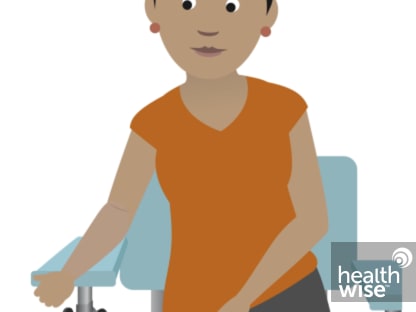Test Overview
The high-sensitivity C-reactive protein (hs-CRP) test is a blood test that finds lower levels of C-reactive protein (CRP). This protein measures general levels of inflammation in your body. The hs-CRP can be used to find the risk for heart disease and stroke in people who don't already have heart disease.
The hs-CRP test is different than the standard CRP test. The standard test measures high levels of the protein to find different diseases that cause inflammation. The hs-CRP test measures low levels and focuses on the risk of heart disease and stroke.
Why It Is Done
This test may be done to find out if you have an increased chance of having a sudden heart problem, such as a heart attack. But the connection between high CRP levels and heart attack risk is not understood very well.
A high level of CRP may mean a higher-than-normal risk of heart attack and stroke. Your CRP level can help you and your doctor make decisions about lifestyle changes and medicines that can lower your risk.
How To Prepare
In general, there's nothing you have to do before this test, unless your doctor tells you to.
How It Is Done
A health professional uses a needle to take a blood sample, usually from the arm.
How long the test takes
The test will take a few minutes.
Watch
How It Feels
When a blood sample is taken, you may feel nothing at all from the needle. Or you might feel a quick sting or pinch.
Risks
There is very little chance of having a problem from this test. When a blood sample is taken, a small bruise may form at the site.
Results
Each lab has a different range for what's normal. Your lab report should show the range that your lab uses for each test. The normal range is just a guide. Your doctor will also look at your results based on your age, health, and other factors. A value that isn't in the normal range may still be normal for you.
A high hs-CRP doesn't mean that you have a heart problem, but it may show a higher chance of having one. Other problems can also cause the level of hs-CRP to go up.
Related Information
Credits
Current as of: September 25, 2025
Author: Ignite Healthwise, LLC Staff
Clinical Review Board
All Ignite Healthwise, LLC education is reviewed by a team that includes physicians, nurses, advanced practitioners, registered dieticians, and other healthcare professionals.
Current as of: September 25, 2025
Author: Ignite Healthwise, LLC Staff
Clinical Review Board
All Ignite Healthwise, LLC education is reviewed by a team that includes physicians, nurses, advanced practitioners, registered dieticians, and other healthcare professionals.


